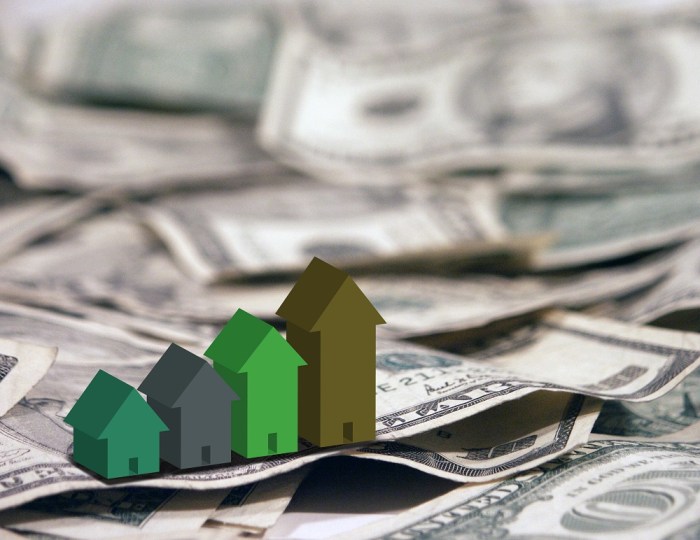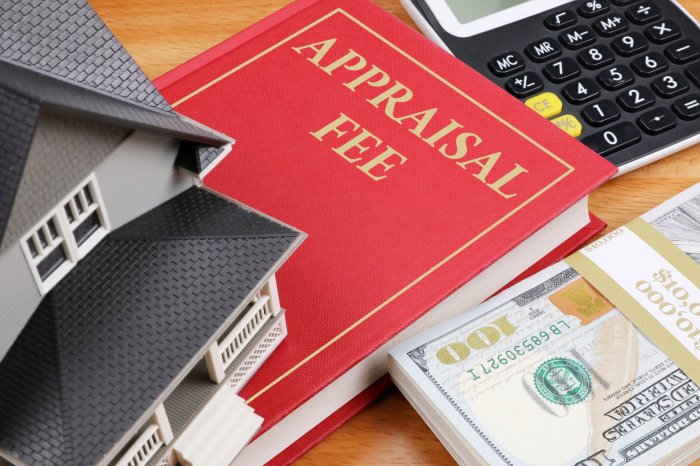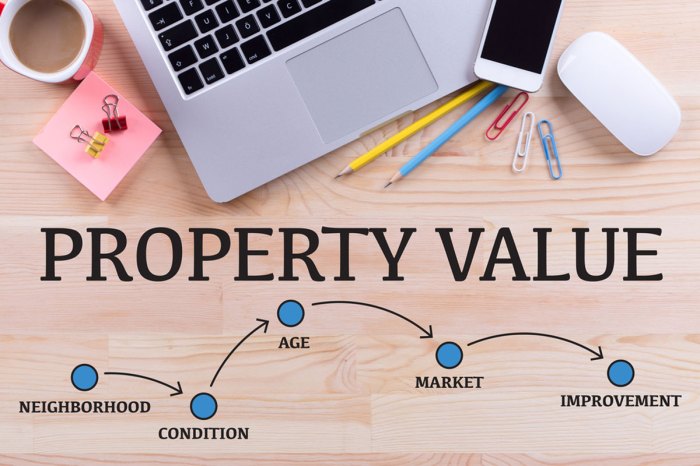How much does a real estate appraisal cost? This seemingly simple question unveils a surprisingly complex landscape of factors influencing the final price. From property size and location to the appraiser’s experience and the type of appraisal needed, numerous variables contribute to the overall cost. Understanding these factors empowers you to make informed decisions and secure the most appropriate and cost-effective appraisal for your specific needs.
This guide will explore the various aspects impacting appraisal costs, providing you with a clear understanding of what to expect.
We’ll delve into the intricacies of different appraisal types, including drive-by appraisals, full appraisals, and review appraisals, highlighting their respective costs and applications. The qualifications and experience of the appraiser also play a significant role, and we’ll examine how these factors impact pricing. Additionally, we will address potential hidden costs, such as travel expenses and expedited service fees, to ensure you’re fully prepared for the entire appraisal process.
Finally, we’ll offer strategies for negotiating fees and selecting an appraiser who best suits your budget and requirements.
Factors Influencing Appraisal Costs

Several factors interact to determine the final cost of a real estate appraisal. Understanding these influences allows property owners and buyers to better anticipate expenses and select the most appropriate appraisal service. The cost isn’t simply a fixed fee; it’s a reflection of the time, expertise, and resources required for a thorough and accurate assessment.
Property Size and Appraisal Fees
Generally, larger properties necessitate more extensive inspections and data analysis, thus increasing appraisal costs. A sprawling mansion requires significantly more time to evaluate than a small condominium. Appraisers typically charge by the hour or per square foot, with larger properties commanding higher fees due to the increased workload. For example, appraising a 5,000 square foot home will likely cost more than appraising a 1,000 square foot home, even in the same neighborhood.
The complexity of the property’s layout and features also contribute to the time spent, further impacting the overall cost.
Property Location and Appraisal Costs
Geographic location plays a crucial role in determining appraisal costs. Appraisals in densely populated urban areas with complex property records and higher property values often cost more than those in rural areas. This is due to factors such as increased travel time, the need for more extensive market research, and the higher value of the properties themselves. For instance, an appraisal in Manhattan, New York, will likely be more expensive than a similar appraisal in a rural town in Nebraska, reflecting the difference in market complexity and property values.
Property Type and Appraisal Fees
The type of property being appraised significantly influences the cost. Commercial properties, with their intricate lease agreements, income streams, and specialized features, typically require more extensive analysis than residential properties, leading to higher appraisal fees. Industrial properties, with their unique operational considerations and specialized equipment, often fall into the same category. Residential appraisals are generally the least expensive, followed by commercial, and then industrial appraisals.
The complexity of the property’s use and the required data analysis drive the cost difference.
Appraisal Complexity and Pricing
The complexity of the appraisal assignment directly impacts the cost. Properties with unique architectural features, historical significance, or requiring specialized expertise (e.g., appraisals of high-value art collections within a property) will necessitate more in-depth analysis and potentially the involvement of specialized appraisers, leading to increased fees. For example, appraising a historic landmark would require more research and specialized knowledge, resulting in a higher cost compared to appraising a standard suburban home.
Geographic Regional Variations in Appraisal Costs
Appraisal costs vary considerably across different geographic regions. The cost of living, the average property value, and the prevailing market conditions all contribute to regional differences. Highly competitive markets with a high volume of transactions might have lower appraisal fees due to economies of scale, while less active markets with fewer appraisers might command higher fees. A general comparison might show higher appraisal costs in major metropolitan areas compared to smaller towns or rural areas, reflecting differences in market complexity and appraiser demand.
Types of Appraisals and Their Costs

Real estate appraisals come in various forms, each with a different scope of work and, consequently, a different cost. The type of appraisal needed depends heavily on the purpose of the appraisal itself. Understanding these differences is crucial for both homeowners and professionals involved in real estate transactions. This section will detail the common types of appraisals and their associated costs.
The cost of a real estate appraisal isn’t simply a fixed number; it varies based on several factors, including property type, location, complexity, and the type of appraisal required. A simple drive-by appraisal will naturally cost less than a comprehensive full appraisal. Understanding the distinctions between these types is essential for budgeting and selecting the appropriate appraisal for your specific needs.
Drive-By Appraisals
Drive-by appraisals, also known as exterior-only appraisals, involve a brief visual inspection of the property from the street or immediate surroundings. The appraiser doesn’t enter the property and relies primarily on exterior observations, public records, and comparable sales data to estimate the property’s value. These are typically used for situations requiring a quick, cost-effective value estimate, such as portfolio monitoring by lenders or preliminary assessments for insurance purposes.
A drive-by appraisal might cost between $200 and $500, significantly less than a full appraisal.
Full Appraisals
Full appraisals, conversely, are far more comprehensive. They involve a thorough interior and exterior inspection of the property, including detailed measurements, photographs, and a review of comparable properties (comps) in the immediate vicinity. The appraiser assesses the property’s condition, features, and market value with considerable detail. This type is necessary for most major real estate transactions, such as mortgage applications, estate settlements, and divorce proceedings.
The cost of a full appraisal typically ranges from $300 to $600, or even more for complex properties or those located in high-value markets. For example, a large, custom-built home in a desirable neighborhood will command a higher appraisal fee than a smaller, standard home in a less competitive area.
Review Appraisals
A review appraisal involves a qualified appraiser examining an existing appraisal report to verify its accuracy, methodology, and compliance with professional standards. This is not a new appraisal; instead, it’s a quality control check. Review appraisals are often required by lenders or other parties needing assurance about the validity of an existing appraisal. This type of appraisal usually costs significantly less than a full appraisal, typically ranging from $150 to $300, depending on the complexity of the original report and the level of review required.
For instance, a lender might order a review appraisal if they have concerns about the original appraisal’s methodology or conclusions.
Comparison of Appraisal Types
| Appraisal Type | Scope of Work | Typical Cost (USD) | Typical Use Cases |
|---|---|---|---|
| Drive-By | Exterior inspection only | $200 – $500 | Portfolio monitoring, preliminary insurance assessments |
| Full Appraisal | Thorough interior and exterior inspection | $300 – $600+ | Mortgage applications, estate settlements, divorce proceedings |
| Review Appraisal | Review of existing appraisal report | $150 – $300 | Lender quality control, due diligence |
Appraiser Qualifications and Fees

The cost of a real estate appraisal is significantly influenced by the qualifications and experience of the appraiser. Understanding this relationship is crucial for homeowners and real estate professionals alike, ensuring a fair price for a high-quality appraisal. More experienced and highly qualified appraisers often command higher fees, reflecting their expertise and the value they bring to the process.Appraiser fees are not standardized, and several factors contribute to the variability in pricing across different appraisers.
These factors influence both the base fee and any additional charges. This section will examine the key elements that create this price variation.
Appraiser Experience and Fees
Generally, a direct correlation exists between an appraiser’s experience and their fees. More experienced appraisers typically charge higher fees due to their established reputation, extensive knowledge of local markets, and proven track record of accurate and reliable appraisals. Newly licensed appraisers, while possessing the necessary qualifications, often charge lower fees to gain experience and build their client base.
For example, a senior appraiser with 20 years of experience and a strong portfolio of complex assignments might charge significantly more than a newly licensed appraiser with limited experience. The difference in fees often reflects the increased efficiency, accuracy, and depth of analysis provided by the more seasoned professional.
Factors Contributing to Fee Variations
Several factors beyond experience influence an appraiser’s fees. These include:
- Certifications and Designations: Appraisers holding advanced certifications, such as MAI (Member, Appraisal Institute) or SRA (Senior Residential Appraiser), typically charge higher fees due to their specialized knowledge and rigorous training. These designations demonstrate a commitment to professional excellence and adherence to strict ethical standards.
- Memberships in Professional Organizations: Membership in professional organizations like the Appraisal Institute reflects a commitment to continuing education and professional development. Appraisers who actively participate in these organizations may charge higher fees to reflect their ongoing investment in their expertise.
- Geographic Location: Appraiser fees can vary significantly based on location. Appraisers in high-demand areas with higher property values and a competitive market may charge more than those in less populated areas with lower property values. The cost of living and market conditions in a specific region also play a significant role.
- Type of Property: The complexity of the property being appraised impacts the fee. Appraising a complex commercial property requires more time and expertise than appraising a simple residential property, resulting in a higher fee.
- Appraisal Scope and Complexity: The scope of work, including the number of properties to be appraised, the depth of analysis required, and any specialized requirements (e.g., environmental assessments), directly impacts the time investment and, consequently, the appraisal fee.
Comparison of Appraiser Fees within a Region
Direct comparison of appraiser fees within a specific region requires researching multiple appraisers’ fee schedules. This research might involve contacting several appraisers directly or reviewing their websites. While precise figures cannot be provided here due to the dynamic nature of appraisal fees and the confidentiality of client information, it is reasonable to expect a range of fees within a given region, reflecting the factors discussed above.
For example, in a metropolitan area, one might find fees ranging from $300 to $1000 or more for a standard residential appraisal, with the higher end reflecting greater experience, specialized certifications, and complex property characteristics. This range highlights the importance of obtaining multiple quotes to ensure a fair and competitive price.
The Appraisal Process and Associated Costs: How Much Does A Real Estate Appraisal Cost

Understanding the steps involved in a real estate appraisal provides clarity on the overall cost. The process is methodical, with each stage contributing to the final valuation. Costs vary depending on the complexity of the property and the appraiser’s experience, but a general breakdown helps illustrate the financial commitment involved.
A typical real estate appraisal involves several key stages, each associated with specific tasks and costs. These costs can be categorized as direct (directly related to the appraisal itself) and indirect (overhead and administrative costs). While a precise breakdown isn’t always provided item-by-item by appraisers, understanding these stages provides a better understanding of the overall fee.
Data Collection and Property Inspection
This initial phase involves gathering crucial information about the subject property and comparable properties. The appraiser researches property records, including tax assessments, prior sales, and building permits. They then conduct a thorough physical inspection of the property, noting its features, condition, and any relevant details. Costs associated with this stage include the appraiser’s time, travel expenses (if significant), and potentially fees for accessing public records or specialized databases.
For example, an appraisal of a complex multi-unit building in a sprawling area might involve more travel and record research, increasing the cost of this stage compared to a simple single-family home appraisal in a readily accessible location.
Comparable Property Analysis
This stage involves identifying and analyzing properties similar to the subject property that have recently sold. The appraiser carefully compares features, location, and sale prices to determine appropriate adjustments for differences. This requires significant expertise and judgment, and the cost associated with this stage reflects the appraiser’s time and skill in performing this critical analysis. The more complex the property type or location, the more time and effort this phase requires, impacting the overall appraisal cost.
For instance, finding truly comparable properties for a unique historic home will take considerably more time and effort than finding comparables for a standard suburban house.
Valuation Techniques and Reconciliation
The appraiser applies various valuation techniques, such as the sales comparison approach, the cost approach, and the income approach, to estimate the subject property’s value. This phase requires advanced analytical skills and experience in interpreting market data. The cost here reflects the appraiser’s expertise and time spent applying these complex methods. The complexity of the property and the required valuation methods directly impact this stage’s cost.
A complex commercial property requiring detailed income analysis will cost more than a simple residential property.
Report Preparation and Delivery
The final stage involves compiling all findings into a comprehensive appraisal report. This report must adhere to strict professional standards and clearly document the appraiser’s methodology and conclusions. The cost associated with this stage includes the appraiser’s time in writing and formatting the report, and potentially costs associated with printing and delivery. The length and complexity of the report directly impact this cost; a detailed appraisal report for a commercial property will require significantly more time and effort than a simpler report for a residential property.
Flowchart Illustrating the Appraisal Process and Cost Breakdown
The following describes a flowchart illustrating the appraisal process and cost breakdown at each stage. Imagine a flowchart with rectangular boxes representing each stage. Arrows connect the boxes to indicate the sequential flow of the process. Each box contains the stage name (e.g., Data Collection, Comparable Analysis, etc.) and a brief description of the associated costs (e.g., appraiser’s time, travel, research fees).
The flowchart starts with “Client Request” and ends with “Final Appraisal Report Delivery”. Each step has a corresponding cost element associated with it, visually represented in the flowchart perhaps by a small cost symbol ($) next to each stage, with the overall cost accumulating as the process moves forward. The complexity of each stage is visually implied by the size of the box or the intensity of the cost symbol, illustrating how some stages (like Comparable Property Analysis) may be more time-consuming and thus more expensive than others (like Report Delivery).
Hidden or Additional Costs

While the initial quote for a real estate appraisal provides a good starting point, it’s crucial to understand that unforeseen expenses can arise. These additional costs can significantly impact the final price, sometimes unexpectedly. Understanding these potential additions allows for better budgeting and avoids unpleasant surprises.Unexpected circumstances and complexities within the appraisal process can lead to increased costs.
For instance, if the property requires extensive research due to its age, unique features, or limited comparable sales data, the appraiser might need to dedicate more time and resources, resulting in higher fees. Similarly, if access to the property is difficult or requires specialized equipment, this will add to the overall expense. Delays caused by factors outside the appraiser’s control, such as inclement weather or unavailability of necessary documents, can also lead to increased costs, especially if expedited services are required to meet deadlines.
Travel Expenses
Appraisers often charge for travel time and mileage, especially for properties located in remote areas or requiring significant travel distances. These expenses can add up, particularly for properties located far from the appraiser’s base of operations. For example, an appraisal for a rural property 100 miles away might incur substantial travel costs compared to a property within the appraiser’s local area.
The specific rates for travel vary widely depending on location and the appraiser’s individual policy.
Expedited Service Fees
If you require a faster turnaround time than the standard appraisal timeframe, you will likely incur expedited service fees. Appraisers often prioritize rush orders, which necessitates adjusting their schedule and potentially working overtime. The added cost for expedited service can vary greatly depending on the urgency and the appraiser’s availability. For instance, needing an appraisal within 24 hours for a time-sensitive closing could add a significant premium compared to a standard 7-10 day turnaround.
Additional Research and Data Acquisition Costs
The complexity of the property and the availability of comparable sales data heavily influence the cost. If the property is unique, requires extensive research into historical data, or if comparable sales data is scarce, the appraiser may need to spend additional time and resources gathering the necessary information, resulting in increased fees. For example, a historic home might require research into architectural styles and historical records, significantly increasing the appraisal cost.
Unexpected Property Conditions, How much does a real estate appraisal cost
Discovering unforeseen property conditions during the inspection, such as significant structural damage or environmental concerns, could lead to additional costs. The appraiser may need to consult specialists, conduct further investigations, or perform additional analyses to fully assess the impact on the property’s value. This can significantly increase the overall appraisal fee, especially if specialized expertise or testing is required. For instance, the discovery of asbestos would necessitate further investigation and potentially involve the cost of environmental testing.
Potential Hidden Costs Associated with a Real Estate Appraisal
It’s important to discuss all potential costs upfront with the appraiser to avoid surprises. Here is a list of potential hidden costs:
- Mileage and travel expenses beyond a specified radius.
- Fees for expedited service or rush orders.
- Costs associated with additional research or data acquisition.
- Charges for specialized reports or consultations (e.g., environmental, engineering).
- Fees for correcting errors or revisions requested after the initial appraisal report.
- Costs associated with unforeseen property conditions requiring further investigation.
Negotiating Appraisal Fees
Negotiating appraisal fees is possible and can sometimes lead to significant savings, particularly for larger or more complex projects. While appraisers have established fee structures, they often have some flexibility, especially when dealing with repeat clients or projects with specific characteristics. Successful negotiation requires a balance of respect for the appraiser’s expertise and a clear understanding of your budgetary constraints.Appraisers typically base their fees on several factors, including property type, location, complexity of the appraisal, and the appraiser’s experience and reputation.
Understanding these factors empowers you to engage in a productive negotiation. A thorough understanding of the market rate for appraisals in your area is also crucial for a successful negotiation.
Factors to Consider When Negotiating
Before initiating negotiations, gather information on comparable appraisal services in your area. Check with other real estate professionals, online directories, and review sites to establish a benchmark for reasonable fees. Consider the scope of work required; a more extensive appraisal involving specialized expertise will naturally command a higher fee. If you have a long-term relationship with a particular appraiser, you might leverage that relationship for a potentially better rate.
Finally, clearly articulate your budget constraints and explore options such as phased appraisals or reduced scope if necessary. For example, if you need a quick turnaround time, this might be a negotiable point affecting the final cost.
Strategies for Negotiating Appraisal Fees
Several strategies can improve your chances of negotiating a favorable fee. Begin by clearly explaining the project’s specifics and your budget. Ask the appraiser about their fee structure in detail, inquiring about any potential discounts for bundled services or repeat business. Explore alternative options, such as a less comprehensive appraisal if it meets your needs, to reduce the overall cost.
Maintain a respectful and professional tone throughout the negotiation, focusing on finding a mutually agreeable solution. If the initial offer is too high, propose a counteroffer supported by your research on market rates. For instance, if the appraiser quotes $1000 but your research suggests $800 is the average, propose a price closer to the average, justifying it with your research.
Always be prepared to walk away if the negotiation doesn’t result in a mutually acceptable agreement.
Choosing an Appraiser Based on Cost and Expertise
Selecting an appraiser involves careful consideration of both cost and expertise. Don’t solely focus on the lowest price; a less experienced appraiser might deliver an inadequate appraisal, potentially costing you more in the long run. Check the appraiser’s qualifications, experience, and licensing. Seek referrals from trusted sources, such as real estate agents or other professionals in the industry.
Request examples of their previous work and examine their client reviews. A balance between cost and quality is essential; an experienced appraiser might charge more, but their expertise ensures a more accurate and reliable appraisal. This is particularly critical for complex properties or transactions with high financial stakes. Consider that an inaccurate appraisal can lead to delays, disputes, and even financial losses, outweighing any initial savings from choosing a less experienced or less reputable appraiser.
Illustrative Examples of Appraisal Costs

Understanding the cost of a real estate appraisal requires considering various factors, including property type, location, and the complexity of the appraisal itself. The following examples illustrate the range of costs one might encounter. Note that these are illustrative examples and actual costs may vary depending on market conditions and individual appraisers.
Example 1: Single-Family Home Appraisal in a Suburban Area
This example involves a single-family home appraisal in a typical suburban neighborhood. The property is a 2,500 square foot home with three bedrooms and two bathrooms, situated on a 0.25-acre lot. The home is approximately 15 years old and is in good condition, requiring no significant repairs. The location is a stable, middle-class neighborhood with consistent property values. The appraisal, completed by a certified residential appraiser, cost $500.
This price reflects a standard appraisal for a relatively straightforward property in a predictable market. The appraiser utilized comparable sales data from the immediate vicinity, taking into account factors like lot size, square footage, and recent renovations in similar properties.
Example 2: Commercial Building Appraisal in a Downtown Area
This example focuses on a commercial building appraisal in a bustling downtown area. The property is a three-story office building with a total of 10,000 square feet of leasable space. The building is 30 years old and requires some minor renovations. The location is in a high-demand area with a high concentration of businesses and significant competition for commercial real estate.
The appraisal, completed by a certified commercial appraiser with extensive experience in the downtown market, cost $2,500. This higher cost reflects the increased complexity of valuing a commercial property, which involves analyzing rental income, operating expenses, and market conditions specific to commercial real estate. The appraiser utilized various valuation methods, including the income approach and the sales comparison approach, to arrive at a final value.
Example 3: Luxury Home Appraisal in a High-End Neighborhood
This example details the appraisal of a luxury home in a prestigious, high-end neighborhood. The property is a 7,000 square foot mansion with five bedrooms, five bathrooms, and extensive landscaping. The home includes high-end finishes, a pool, and a detached guest house. The location is known for its exclusivity and high property values. The appraisal, conducted by a highly experienced and specialized appraiser with expertise in luxury homes, cost $3,500.
This significantly higher cost reflects the greater complexity and expertise required to value a luxury property, which involves considering unique features, high-end finishes, and the specific characteristics of the exclusive market. The appraiser used a combination of comparable sales analysis, cost approach, and income approach methods, meticulously considering the unique aspects of the property and its market context.
Closing Notes
Determining the cost of a real estate appraisal requires a careful consideration of several interconnected factors. While the final price can vary significantly, understanding the influence of property characteristics, appraisal type, appraiser qualifications, and potential hidden costs allows for better budget planning and informed decision-making. By leveraging the insights provided in this guide, you can navigate the appraisal process with confidence, securing a reliable appraisal that meets your specific needs without unnecessary expense.
Remember to always compare quotes from multiple appraisers and clarify all fees upfront to ensure a transparent and satisfactory experience.